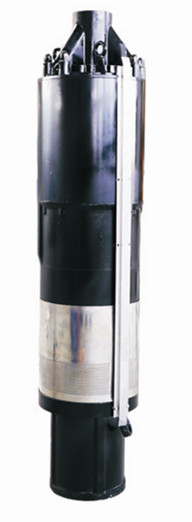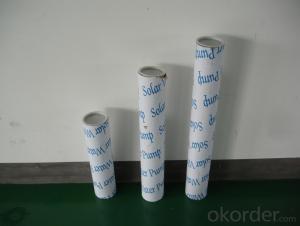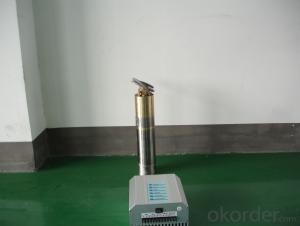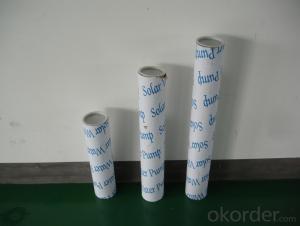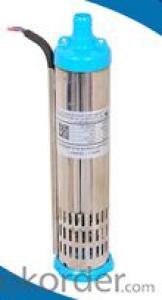Solar Pump Company Solar Water Pump 3ds-14
- Loading Port:
- China Main Port
- Payment Terms:
- TT OR LC
- Min Order Qty:
- -
- Supply Capability:
- 300 sets /month
OKorder Service Pledge
OKorder Financial Service
You Might Also Like
Product description:
Product: Solar water pump
Model:3DS-14
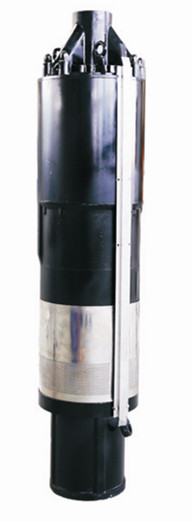
Appilication:
submersible pump
for deep well or pond or lake
for irrigation of a big farm with 12000 m2
Product specification:
flow rate:20m3/ hour, 160m3/day.
lift: 10m-50m
pump diameter: 296mm
well diameter more than 310mm
with BLDC motor, motor power:4000W
but only need solar power:2200W, our pump can save more than 50% solar panel power.
Material:
Pump inside: stainless steel and wearable nylon,it enables our solar pump to have 10 years sevice life.
Motor length:30cm,80% shorter than other motors. So that you can pump 80% more water by our solar pump.
Certification:
3 International patent
ISO9001
CE
Warranty:2 years
- Q: How does a solar pump help in reducing reliance on diesel generators?
- A solar pump helps in reducing reliance on diesel generators by harnessing solar energy to power the pump instead of relying on fossil fuel-based diesel generators. This not only decreases the need for diesel fuel but also reduces emissions and operating costs associated with running diesel generators. Solar pumps offer a sustainable and environmentally friendly alternative for various applications such as agricultural irrigation, water supply, and livestock watering.
- Q: Can solar pumps be used for swimming pools or ponds?
- Yes, solar pumps can be used for swimming pools or ponds. Solar-powered pumps are an eco-friendly and cost-effective option for circulating and filtering water in outdoor spaces. They harness energy from the sun to power the pump, making them a sustainable choice for maintaining the water quality in swimming pools or ponds.
- Q: How does the size of the solar panel affect the performance of a solar pump?
- The performance of a solar pump is directly impacted by the size of the solar panel. An increase in the size of the panel typically results in a higher electricity output, which in turn powers the pump and improves its performance. The conversion of sunlight into electrical energy by solar panels occurs through the photovoltaic effect. The amount of electricity produced is directly proportional to the surface area of the panel. Consequently, a larger panel captures more sunlight due to its increased surface area, leading to a higher production of electricity. With a greater supply of electricity, the solar pump can operate with greater efficiency and effectiveness. It can pump water at a faster rate and maintain a consistent flow, even under low light conditions. This is particularly significant in regions with limited sunlight or during cloudy days when the generation of energy by the solar panel is diminished. Furthermore, a larger solar panel permits the storage of excess energy in batteries. This enables the pump to continue functioning during nighttime or when sunlight is unavailable. As a result, a continuous water supply is ensured, and the overall performance of the solar pump is enhanced. To summarize, the performance of a solar pump is directly influenced by the size of the solar panel. A larger panel generates more electricity, thereby improving the efficiency of the pump, the flow of water, and the ability to operate under low light conditions. Therefore, selecting an appropriately sized solar panel is crucial for optimizing the performance of a solar pump.
- Q: How does a solar pump handle water quality monitoring?
- A solar pump, by itself, does not handle water quality monitoring. However, additional equipment and sensors can be integrated with a solar pump system to monitor water quality parameters such as pH level, turbidity, conductivity, and temperature. These sensors provide real-time data on water quality, allowing users to assess the suitability of the water for various purposes and take necessary actions if any issues are detected.
- Q: Are there any limitations to the depth of water a solar pump can lift?
- Yes, there are limitations to the depth of water a solar pump can lift. The maximum depth a solar pump can lift water depends on various factors such as the power output of the solar panels, the efficiency of the pump, and the capacity of the pump. Generally, solar pumps are most effective for lifting water from depths up to around 200 feet (60 meters). Beyond this depth, additional measures such as using multiple pumps in series or employing a different type of pump may be required.
- Q: Can a solar pump work at night or on cloudy days?
- Solar pumps are unable to operate at night or during cloudy days. They depend on sunlight to produce electricity, which then energizes the pump to extract water. In the absence of sunlight, the pump lacks the necessary energy source to operate. Consequently, solar pumps are exclusively designed for use during daylight hours when ample sunlight is present.
- Q: Can a solar pump be used for water supply in coffee plantations?
- Yes, a solar pump can be used for water supply in coffee plantations. Solar pumps are efficient and environmentally friendly alternatives to traditional pumps, as they utilize solar energy to power the pump and provide water for irrigation. This makes them well-suited for remote locations such as coffee plantations, where access to electricity may be limited. Additionally, solar pumps help reduce operating costs and dependency on fossil fuels, making them a sustainable solution for water supply in coffee plantations.
- Q: Can a solar pump be used for water supply in refugee camps or disaster relief areas?
- Yes, a solar pump can indeed be used for water supply in refugee camps or disaster relief areas. Solar pumps are an excellent solution for these scenarios as they rely on sunlight to generate power and do not require a constant supply of electricity. This makes them ideal for remote locations or areas with limited access to traditional power sources. Solar pumps can be used to extract water from wells, boreholes, or other water sources and can be configured to provide a reliable and sustainable supply of water. They are typically equipped with photovoltaic panels that convert sunlight into electricity, which powers the pump and allows it to draw water from underground sources. The use of solar pumps in refugee camps or disaster relief areas offers numerous advantages. Firstly, they are environmentally friendly, as they do not produce any greenhouse gas emissions or contribute to air pollution. Additionally, solar pumps require minimal maintenance and have a long lifespan, reducing operating costs and the need for constant repairs. Furthermore, solar pumps are often designed with built-in water purification systems, ensuring that the water extracted is clean and safe for consumption. This is particularly crucial in disaster-stricken areas or refugee camps where access to clean water is essential for basic hygiene and the prevention of waterborne diseases. In conclusion, solar pumps are an excellent choice for water supply in refugee camps or disaster relief areas due to their reliance on sunlight, ease of use, low maintenance requirements, and ability to provide clean and sustainable water. They offer a practical and cost-effective solution to addressing water scarcity in these challenging environments.
- Q: Can a solar pump be used in areas with limited access to water treatment facilities?
- Yes, a solar pump can be used in areas with limited access to water treatment facilities. Solar pumps are designed to extract water from various sources such as wells, rivers, or lakes, and can be used to provide clean water for drinking, irrigation, or other purposes. The use of a solar pump eliminates the need for electricity or fuel, making it a cost-effective and sustainable solution for areas without access to traditional water treatment facilities.
- Q: How does the efficiency of a solar pump compare to traditional electric pumps?
- The efficiency of a solar pump is generally considered to be higher than that of traditional electric pumps. Solar pumps utilize photovoltaic (PV) panels to convert sunlight into electricity, which in turn powers the pump. This renewable energy source eliminates the need for grid electricity, reducing operating costs and environmental impact. One key advantage of solar pumps is their ability to operate independently of the power grid, making them suitable for remote and off-grid locations. Traditional electric pumps rely on constant grid electricity supply, which can be unreliable in some areas. Solar pumps provide a reliable and consistent water supply, particularly in regions with ample sunlight. Solar pumps also have a longer lifespan and require less maintenance compared to traditional electric pumps. The absence of fuel or moving parts in solar pumps reduces the risk of breakdowns and the need for regular servicing. This translates into lower maintenance costs and increased reliability, making solar pumps a cost-effective long-term investment. Furthermore, solar pumps are environmentally friendly as they produce zero greenhouse gas emissions during operation. In contrast, traditional electric pumps rely on fossil fuel-generated electricity, contributing to carbon emissions and pollution. By harnessing the power of the sun, solar pumps promote sustainable and clean energy solutions. While solar pumps tend to be more efficient overall, their performance can vary depending on factors such as sunlight availability, pump size, and water demand. It is essential to properly size and design a solar pump system to match the specific requirements of the application to ensure optimal efficiency. In summary, the efficiency of a solar pump is generally higher than that of traditional electric pumps. Solar pumps offer numerous benefits, including independence from the power grid, cost savings, reduced maintenance, and environmentally friendly operation.
Send your message to us
Solar Pump Company Solar Water Pump 3ds-14
- Loading Port:
- China Main Port
- Payment Terms:
- TT OR LC
- Min Order Qty:
- -
- Supply Capability:
- 300 sets /month
OKorder Service Pledge
OKorder Financial Service
Similar products
Hot products
Hot Searches
Related keywords

